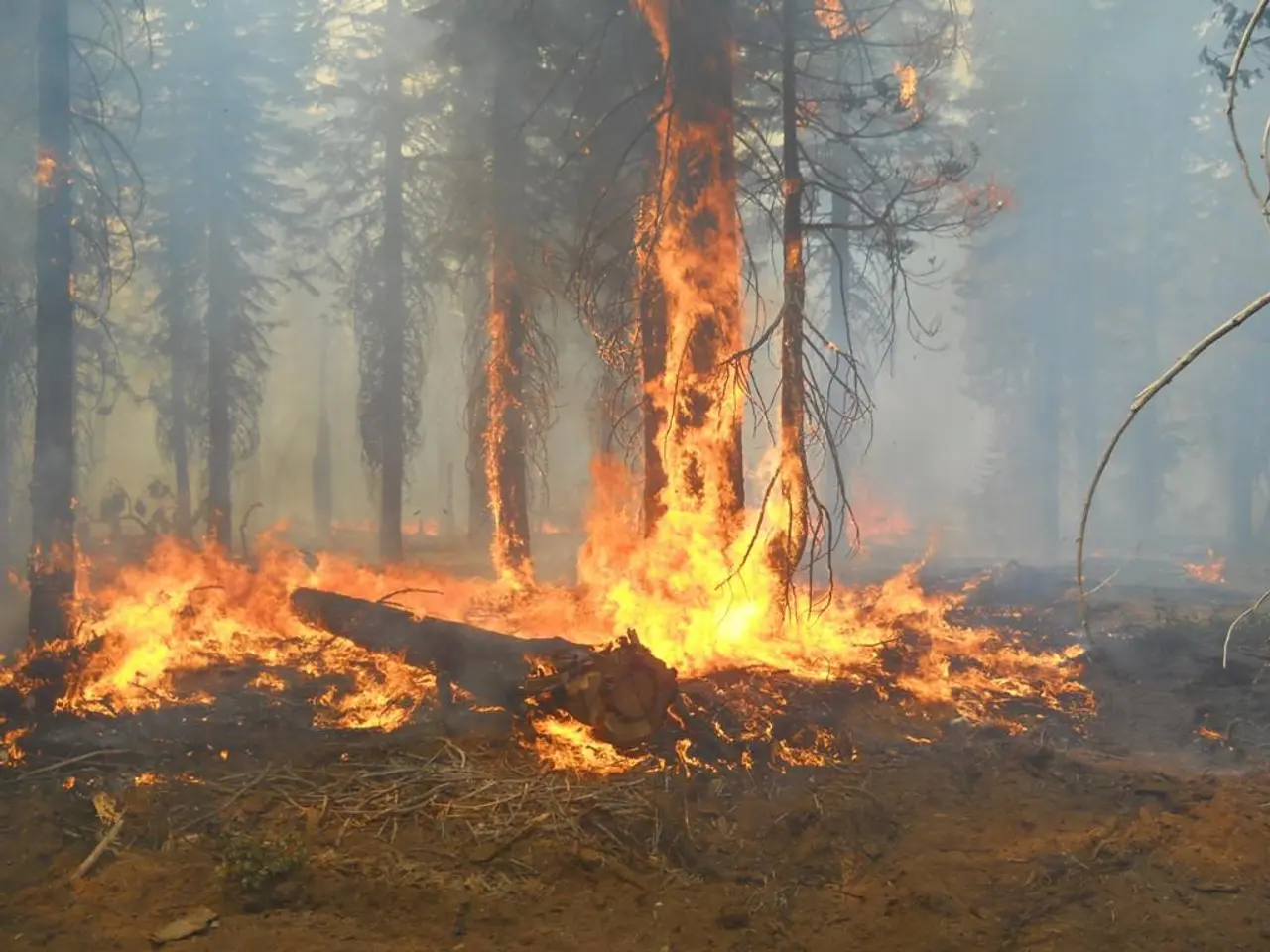Wildfires sweep through southern Europe, leaving at least 3 dead and causing thousands to be forced from their homes.
In a series of devastating events, Europe is currently grappling with a historic wildfire crisis, with over one million hectares of land burned within the European Union alone. The summer of 2025 has seen some of the most extreme weather conditions, including an intense heatwave, severe drought, and record-low humidity, creating ideal conditions for rapid fire spread.
The heatwave, characterized by temperatures soaring above 40°C, has been particularly severe in Spain and Portugal, reaching up to 46°C in some regions. This extreme heat, coupled with the dryness and low humidity, has made vegetation extremely combustible, leading to the devastating wildfires that have swept across the continent.
The wildfires have had a profound impact, with Spain losing over 400,000 hectares, and Portugal nearly 274,000 hectares. The fires have claimed at least four lives in Spain and have led to mass evacuations, including 50,000 people in Turkey. Furthermore, heat-related deaths during the heatwave reached about 1,500 in 12 major European cities, primarily affecting older populations.
The wildfires have not only caused extensive damage to the environment but have also posed significant health risks due to toxic pollution, including dangerous concentrations of carbon monoxide.
International aid and response efforts have been mobilized to combat these unprecedented fires. Firefighting efforts have involved emergency response cooperation across European countries, adapting tactics to the extreme weather conditions. Fire danger forecasts indicate fluctuating risk levels, with some easing expected in southern Europe but increasing risk in northern and western parts of Europe, necessitating ongoing vigilance.
The European Union has sent aid to fire-hit countries, including non-member states, with ground crews and water-dropping aircraft. However, firefighting resources are stretched thin in many affected countries, and authorities have had to adapt their tactics to the unprecedented fire behaviors.
In Spain, Prime Minister Pedro Sánchez expressed condolences after the death of a firefighting volunteer in the Castile and León region. Evacuation centers are filled to capacity in parts of central Spain, and exhausted firefighters are sleeping on the roadside following a night-long shift.
In Montenegro, much of the recent aid effort has been concentrated on the country, where major wildfires continue to burn in rugged areas near the capital, Podgorica. The civil protection agency head, Ljuban Tmusic, stated that the resources available in Montenegro are clearly not enough to handle the wildfires.
In Greece, flames are tearing through pine forests and olive groves near Patras, with firefighters struggling to protect homes and agricultural facilities. A forestry worker was killed Wednesday while responding to a wildfire in southern Turkey, leaving four others injured.
In Turkey, wildfires intensified on Wednesday, with the country reporting a total of 18 deaths due to wildfires since late June, including 10 rescue volunteers and forestry workers who died in July.
Wildfires are also threatening a major city in Turkey, with firefighters struggling to contain a blaze at a nature reserve outside the capital, Skopje, in North Macedonia. In France, temperatures of up to 108 degrees are expected for the third consecutive day, with authorities issuing weather alerts and discretion to cancel public events and cordon off high-risk areas.
These events highlight the growing challenges of managing wildfires under climate change conditions, requiring coordinated international aid and enhanced preparedness to protect lives, health, and ecosystems. Authorities across Europe have cited multiple causes for the massive fires, including careless farming practices, improperly maintained power cables, summer lightning storms, and indications of arson, motivated by rogue developers.
References:
- Euronews
- The Guardian
- Reuters
- World Health Organization
- European Forest Fire Information System
- Amidst the crisis, California Governor Gavin Newsom has expressed concern over the wildfire situation in Europe, highlighting the shared challenges of managing wildfires under climate change conditions.
- As the wildfire crisis continues in Europe, discussions around environmental science and climate-change policies within political circles have intensified, with a focus on implementing effective measures to mitigate the impact of extreme weather events.
- In the aftermath of the devastating wildfires, government agencies in Europe are working closely with music artists to organize benefit concerts, raising funds for wildfire relief efforts and awareness about the importance of preserving the environment.
- The general news media have been covering the wildfire crisis extensively, with updates on the number of hectares burned, the total fatalities, and international aid efforts, while also reporting on the potential long-term effects of wildfires on regional ecosystems and wildlife.
- In response to the wildfires and their impacts on the environment, the European Union has announced plans to invest heavily in research and development within the field of environmental science, aiming to develop more efficient methods for predicting and managing future wildfire events.








